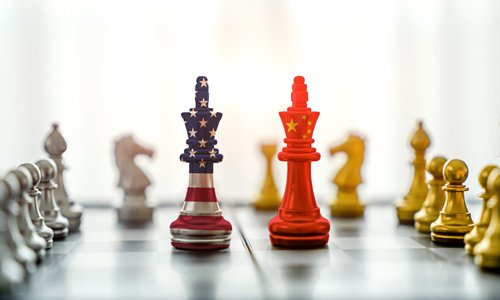HOME >> OPINION
China-US technological cooperation will benefit humanity
Source:Adam Garrie Published: 2019/10/5 10:34:56

File Photo
A recent article in Foreign Policy called on the US and Europe to forge a digital governance alliance as China is "pulling to the pole position in this [technology] race," which reflects typical Cold War mentality.
During the Cold War, individuals in countries as diverse as the US, the Soviet Union and China were rarely impacted by the geopolitical tensions between the superpowers. Today however, an economic and technological cold war is already impacting the lives, livelihoods and commercial opportunities of people throughout the world.
US politicians themselves proclaimed in the 1990s that the end of the Cold War would result in a more cooperative global environment. As China rose to ever more global economic prominence through the ever-growing win-win process of reform and opening-up, it seemed that the concept of rival trading blocs, which had spelled doom several times in the 20th century, was going to be firmly consigned to the scrapheap of history.
The reality of the 21st century, however, has developed differently than the hopes expressed by many economic and political leaders in the 1990s. Today, the US is using tariffs, sanctions and non-tariff barriers to trade in order to re-create rival trading blocs. Many in the US appear convinced that a US-led trading bloc and a China-led trading bloc are destined to compete in a cold war-style economic standoff that will lead to a dearth of US products in China and an end to Chinese products in the US and its economic partners.
The reality, however, is more subtle than the wishes of the more extremist political minds in parts of Washington. China and the US are the world's biggest and most important trading partners and businesses in both countries wish to remain that way. In today's world, the private sector industries and businesses in the US and China are each warning of the economic dangers inherent in full-scale cold war-style trade wars whose focus is on the curtailment of technological exchange.
It is in fact in the area of technological exchange that the US is hinting at some sort of embargo against Chinese goods. Washington's moves to effectively prohibit Huawei products from the US market and the subsequent moves to prohibit US software makers from cooperating with Huawei goes against the letter and spirit of a rule-based economic order in which businesses throughout the world should be able to conduct commerce without external or political interference.
A further irony is that while it is a cliché in certain US circles to say that China is "not a free country," it is not China that seeks to impose cold war-style restrictions on freely conducted international commerce. On the contrary, as the process of reform and opening-up continues - this time in pursuit of building a moderately prosperous society in all respects, China is opening itself up to more foreign direct investment than at any time in modern history, while simultaneously striking new free trade agreements with an ever-growing family of partner countries.
The China-proposed Belt and Road Initiative is a further example of China working with partners from across the world to increase opportunities in areas including but not limited to trade, financial exchange, technological cooperation, cultural development and infrastructure.
When contrasted with China, certain signals coming out of the US indicate an appetite for a more closed, insular and overregulated economic system. This is the case in spite of the fact that US businesses of all sizes tend to prefer an open economic system that is free from political harassment. Consumers too would benefit greatly from diverse options in the retail sector. A lack of diversity limits consumers' choice and tends to result in ordinary people paying more money for inferior products and services. This is not a desirable situation by any means, but it is the unfortunate conclusion of any high-tech trade war.
If during the Cold War, the US and the Soviet Union had cooperated on technological development, all of humanity would have benefited. Instead, the US and the Soviet Union rivaled each other, resulting in a huge effort on both sides aimed at replicating rather than advancing the technologies invented in the other country.
Today, both the US and China are more than capable of rivaling each other and replicating the kinds of technologies pioneered in the other country. But this is not China's goal. China's goal is to form win-win relations with countries across the globe and this very much includes the US.
If the two biggest world economies worked together on matters of technological advancement, the entire world would benefit both at an economic level and in terms of human enlightenment. There is nothing to be gained by erecting digital versions of the Berlin Wall. Instead, win-win cooperation should be the aim of all major technology-producing nations. This is good for business, good for world peace and good for cultural cohesion.
The author is director of Eurasia Future, an independent news platform. opinion@globaltimes.com.cn
Posted in: VIEWPOINT